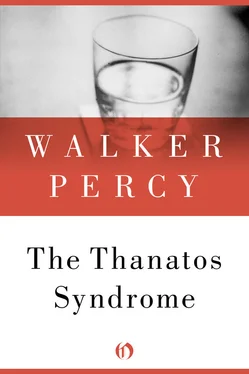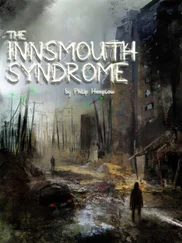What a relief all around.
Lucy deserved her good fortune, restored Pantherburn without prettying it up, replaced rotten joists and moldings, hung her English landscapes for the first time since the War, replaced the silver stolen by the Yankees and General Benjamin F. “Silver Spoons” Butler.
Vergil Bon was toolpusher for the Exxon well, and made enough money to return to L.S.U. for his graduate degree in petroleum geology.
The uncle won the Arkansas National Duck Call for the eleventh time.
6. THE EFFECTS OF the heavy-sodium additive are gradually wearing off in Feliciana.
In the universities, for example, one sees fewer students lying about the campus grooming each other.
There are fewer complaints from parents about “human fly” professors scaling the walls of the women’s dormitories. Fewer professors complain of women students presenting rearward during tutorials.
L.S.U. football had a losing season.
Writers-in-residence, as well as local poets who for years have been writing two-word sentences like the chimp Washoe and during readings uttering exclamations, howls, and routinely exposing themselves, have begun writing understandable novels and genuine poetry in the style of Robert Penn Warren, formerly of Feliciana.
But my practice is still dormant. Still, no one complains of depression, anxiety, guilt, obsessions, or phobias. People hereabouts still suffer from physical illnesses, mainly liver damage and arterial clogging, but, mentally speaking, appear to have subsided into a pleasant funk, saying very little, drinking Dixie beer, fishing, hunting, watching sports on stereo-V, eating crawfish and sucking the heads thoughtfully.
I report this state of affairs to Leroy Ledbetter at the Little Napoleon over a drink of Early Times. Taking his invisible drink during a wipe, he replies only, “So what else is new, Doc?”
7. MY TWO OLD FRIENDS, ex-Jesuit Kev Kevin and ex Maryknoller Debbie Boudreaux, who had long since abandoned belief in God, Jesus, the Devil, the Church, and suchlike in favor of belief in community, relevance, growth, and interpersonal relations, have now abandoned these beliefs as well.
They went their separate ways.
Debbie works quietly as full-time bookkeeper at her father’s new Nissan agency in Thibodaux.
Kev has given up writing political tracts and now writes commercially successful paperback novels about nuns and ex-nuns, priests and ex-priests who engage in a variety of political and sexual activities, both heterosexual and homosexual, gay and lesbian, Marxist and Fascist.
We remain friends. They are in fact quite solicitous of me and my troubles. They call regularly. In turn I call on them to help me out at the hospice. I need them. They are good. They willingly volunteer and often spend a day with me in the AIDS wing or the Alzheimer’s pavilion. All you have to do, I discover, is ask people. They do it because they’re generous and, I think, a bit lonely. I work with them because I need their help and I’ve nothing better to do. In return, I give them couple’s counseling, no charge. They might get back together.
8. CHANDRA IS A BIG SUCCESS on local stereo-V. She didn’t make anchorperson as she had hoped, but eventually did become weatherperson, where she was an immediate hit, her pert manner and general sassiness contrasting with the bland Indiana style of the other members of “NewsTeam-7.” She became a “personality”—”Watch Chan on Channel 7” went the promo.
During the minute or so of happy talk at the end of a newscast, when other members of NewsTeam-7 are smiling and making pleasantries and semi-jokes as they stack their papers, Chandra will have none of it: no grins, no banter. Instead, she often challenges the anchorman: “What you talking about, have a nice day — what’s nice about that?”—socking the weather map with her pointer.
9. WHILE I WAS TALKING to Bob Comeaux and Max Gottlieb in my cell at Angola, I asked the former casually what drugs they used in the pedeuthanasia program at the Qualitarian Life Center. He answered as casually, without thinking about it, as one doctor to another, “Amobarbital and secobarbital, IV.”
“That’s peaceful, isn’t it?”
“They go to sleep like the babies they are.”
“How about the adults?”
“Secobarbital IV and”—he rouses, showing interest—“do you know what I hit on more or less by accident and what is now state of the art?”
“No.”
“Secobarbital plus THC.”
“THC?”
“You know, tetrahydrocannabinol, the active constituent of marijuana — and you want to know something, Tom?”
“Yes.”
“There is an exaltation, a joyousness, a sense of acceptance and affirmation you would have to see to believe.”
“I believe you.”
Max Gottlieb is frowning uneasily and moving toward the door. Bob detains him.
“I don’t mind telling you guys that for the first time we have actually achieved the full meaning of the Greek word eu in euthanasia. Eu means good. I may be simpleminded, but I think good is better than bad, serenity better than suffering. You know what you ought to do, Tom?”
“What?”
“You ought to tell Father Smith about THC.”
“I will.”
“I mean as a therapeutic agent.”
“I understand.”
He looks at me curiously. “Why is your friend Father Smith so dead set against us?”
After a pause — actually I don’t know how to answer him — I think of an answer which might also satisfy my own curiosity. “He thinks you’ll end by killing Jews.”
“What’s that?” Bob asks sharply; then, for some reason, also asks Max, “What’s that? What do you mean?”
Both Bob and Max are embarrassed, Bob for me and Father Smith — I’ve exposed his nuttiness. Max is embarrassed because he is one of those Southern Jews who are embarrassed by the word Jew.
“What does he mean?” asks Bob, opening his hands to both of us.
Max, frowning, is having none of it.
“Tom?” asks Bob Comeaux.
I shrug. “He claims it will eventually end as it did with the Germans, starting out with euthanasia for justifiable medical, psychiatric, and economic reasons. But in the end the majority always gets in trouble, needs a scapegoat, and gets rid of an unsubsumable minority.”
“Unsubsumable?” asks Max, who, I think, wouldn’t mind being subsumable.
“Unsubsumable.”
Bob Comeaux is shaking his head mournfully. “Ah me. I thought I had heard it all. Sorry I asked. Does he think I’m anti-Semitic, for God’s sake?”
“No.”
“Let me tell you something, Tom. I mean, hear this, loud and clear, Doctor!” He is standing arrow-straight, hat held over his heart, addressing me, but for Max’s benefit. “Some of my very dearest friends—”
But Max has had enough of this, of both of us. “Let’s go, Doctor,” he says wearily, holding out one hand to the door, handing along Bob Comeaux with the other.
10. ELLEN IS QUITE HERSELF.
She’s given up tournament bridge — actually she’s not much better at it than I. We play social bridge with Max and Sophie Saturday and Sunday afternoons.
It is pleasant to gaze out over Lake Pontchartrain from Max’s high-rise condo. The bright mazy sun whitens out the sky into a globe of pearly light into which the causeway disappears like a Japanese bridge into a cloud. Between hands Max goes out on the little balcony and focuses his telescope on a coot or a scaup bobbing like corks on the light, vapory water. Once, a memorable day, he put on the high-power lens and we saw a vermilion flycatcher perched on the bridge rail, pooped, taking a breather on the long voyage from Venezuela.
Later Ellen experienced a religious conversion. She became disaffected when the Southern and Northern Presbyterians, estranged since the Civil War, reunited after over a hundred years. It was not the reunion she objected to but the liberal theology of the Northern Presbyterians, who, according to her, were more interested in African revolutionaries than the divinity of Christ. She and others pulled out and formed the Independent Northlake Presbyterian Church.
Читать дальше












